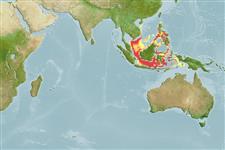>
Anguilliformes (Eels and morays) >
Congridae (Conger and garden eels) > Bathymyrinae
Etymology: Ariosoma: Greek, ari = very, strength, superiority + Greek, soma = body (Ref. 45335); obud: obud which is a Visayan name for eels belonging to Leptocephalidae.
More on author: Herre.
Environment: milieu / climate zone / depth range / distribution range
Ecologie
marien demersaal. Tropical
Verspreiding
Landen | FAO regio's | Ecosystemen | Voorkomen | Point map | Introducties | Faunafri
Western Central Pacific: Philippines.
Grootte / Gewicht / Leeftijd
Maturity: Lm ? range ? - ? cm
Korte beschrijving
Determinatiesleutels | Morfologie | Morfometrie
Color pale brownish gray, very much darker dorsally compared to part below lateral line; interspace between eyes blackish; body with minute dark dots, extending to the hyaline fins, where they form indications of a black margin.
Levenscyclus en paargedrag
Maturiteit | Voortplanting | Paaien | Eieren | Fecunditeit | Larven
Herre, A.W.C.T., 1923. A review of the eels of the Philippine archipelago. Philipp. J. Sci. 23(2):123-236. (Ref. 12748)
Status op de Rode Lijst van het IUCN (Ref. 130435: Version 2024-2)
Gevaar voor de mens
Harmless
Gebruik door de mens
Visserij: van geen belang
Tools
Speciale rapporten
Download XML
Internetbronnen
Estimates based on models
Preferred temperature (Ref.
123201): 23 - 28.3, mean 27.4 °C (based on 56 cells).
Fylogenetische diversiteitsindex (Ref.
82804): PD
50 = 0.5000 [Uniqueness, from 0.5 = low to 2.0 = high].
Bayesian length-weight: a=0.00115 (0.00048 - 0.00277), b=3.06 (2.85 - 3.27), in cm total length, based on LWR estimates for this (Sub)family-body shape (Ref.
93245).
Trofisch niveau (Ref.
69278): 3.9 ±0.7 se; based on size and trophs of closest relatives
Weerstandsvermogen (Ref.
120179): Gemiddeld, minimale populatieverdubbelingstijd 1,4-4,4 jaar (Preliminary K or Fecundity.).
Fishing Vulnerability (Ref.
59153): Low to moderate vulnerability (29 of 100).
